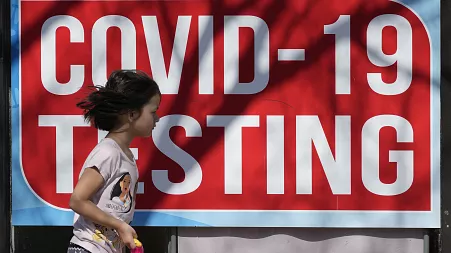People often use the terms "heart attack" and "cardiac arrest" interchangeably, but there are some key differences between the two, according to Dr. Grant Reed, an interventional cardiologist at Cleveland Clinic.
Cardiac arrest occurs when the heart stops beating, which can happen when the heart rate gets too fast or too slow, Reed explained to Newsweek. Heart attacks are among the most common causes of cardiac arrest—although they aren't the only cause.
"Cardiac arrest is a broader term which encompasses patients who have their heart stop, which could be due to a heart attack," Reed said. "However, not all heart attacks cause a cardiac arrest. Only the worst ones do."
Heart attacks occur when there is an abrupt reduction or blockage of blood flow down one of the coronary arteries, the blood vessels that carry oxygen to the heart muscle.
When the heart does not receive enough oxygen, it can lose the ability to function properly. It may begin beating irregularly, a phenomenon doctors call "arrhythmia." Arrhythmias can lead to cardiac arrest, according to Reed.
Symptoms of a heart attack include sweating and chest, jaw or back pain that might radiate down the left arm. These could be signs that the heart is in distress—and early medical intervention is crucial.
"The best thing you can do to prevent and minimize the consequences of a heart attack is recognize the symptoms when they're starting," Reed said.
However, heart attack symptoms vary from patient to patient. Not everyone experiences the classic signs, and they might attribute pain to different parts of the body, like the abdomen. Women, elderly patients and diabetics are more likely to experience unusual symptoms, according to Reed.
He encourages people to pay attention to their bodies and not to be dismissive of pain. Heart attack symptoms come on suddenly, but if chest discomfort does not resolve within five to 10 minutes, patients should seek medical attention.
It's important to call an ambulance or have someone else drive you to the emergency room, Reed added. Never try to drive yourself while experiencing heart attack symptoms.
"The classic saying is 'time is muscle'—the longer that you take to recognize your symptoms and get treated and the longer it takes for the physician to open the blocked artery, the more muscle is at risk," Reed said. "That can leave you with a long life of congestive heart failure and all the consequences of heart-muscle injury and death, which may even include your own death."
Fortunately, if the heart attack is caught early enough, doctors can open the blocked blood vessel. This can abort existing symptoms and prevent the need for additional medications.
A number of risk factors for both heart attacks and sudden cardiac arrest are linked to lifestyle choices. Smoking, high blood pressure and cholesterol, obesity and inactivity can all increase someone's chance of developing heart disease.
To prevent heart conditions, Reed recommends leading a "heart-healthy" life. The Mediterranean diet—which is low in saturated and trans fats and red meat, and high in healthy grains, fruits, vegetables, fish and legumes—is the only diet proven to improve cardiovascular outcomes. It is known to reduce LDL cholesterol levels, which are key indicators of cardiovascular health. Adhering to the Mediterranean menu as often as possible could reduce one's risk of illness.
He also suggests 150 minutes of moderate-intensity exercise per week: "essentially getting a sweat on without overdoing it, and not exerting yourself too [much]."
If you've already had a heart attack, many of the same principles could help prevent another episode, Reed said. Doctors might also prescribe medications to promote blood vessel health.
"Much of the risk of heart attack is determined by our environment, by the foods that we eat, by the lifestyle that we live," Reed said. "And some of it, of course, is determined by genetics. But we need to do all that we possibly can as individuals to reduce our risks by having heart-healthy lifestyles so that we can avoid having a heart attack in the first place."
Disclaimer: The copyright of this article belongs to the original author. Reposting this article is solely for the purpose of information dissemination and does not constitute any investment advice. If there is any infringement, please contact us immediately. We will make corrections or deletions as necessary. Thank you.




